Iran Must Not Be Allowed To Acquire Nukes: Israeli Defense Minister
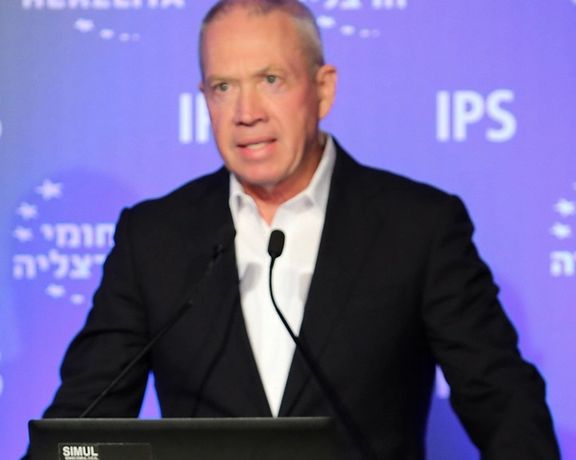
Israel's defense minister says the Islamic Republic must not be allowed to acquire nuclear weapons and Jerusalem must "be prepared for every course of action".

Israel's defense minister says the Islamic Republic must not be allowed to acquire nuclear weapons and Jerusalem must "be prepared for every course of action".
Yoav Gallant made the remarks on Thursday during a meeting with his American counterpart Lloyd Austin who landed in Israel’s Ben Gorion Airport earlier.
Israeli Prime Minister Benjamin Netanyahu told Iran International in an interview Wednesday that he will not tolerate if Iran becomes a nuclear threshold state. Successive Israeli governments have said they keep all options open to prevent Iran from obtaining nuclear weapons.
Austin's talks with Gallant focused in part on Iran, but escalating violence in the West Bank cast a long shadow over the negotiations.
A senior US defense official told Reuters on condition of anonymity that Israel's preoccupation with the West Bank "detracts from our ability to focus on what the strategic threat is right now and that is Iran's dangerous nuclear advances and continuing regional and global aggression."
Pentagon chief Austin, for his part, urged Israeli leaders to take steps to ease tensions in the occupied West Bank, amid growing concerns in Washington that the situation could distract allies from their efforts to counter Iran.
The United States is Israel's closest ally, and both countries are increasingly concerned about Iran's military activities in the region and its nuclear program, which Tehran says is entirely focused on power generation and other peaceful projects.

The family of an Iranian-Canadian woman who disappeared in Iran a year and a half ago, believe she has been imprisoned, one more of the unknown number of dual nationals held hostage by the Islamic Regime.
There is no official record of Behnoush Bahraminia's arrest or indictment, but her family claim two Iranian sources informed them that the regime has locked her up for "super threats to national security."
Typical of the charges alleged against dual-national hostages imprisoned without trial as Iran tries to negotiate for prisoner swaps around the world, Behnoush was traveling to Iran with her partner when she was forcefully disappeared.
Her father Amir Bahraminia told Global News that his daughter who lived in Metro Vancouver since 2013, was not a political person.
“She is in trouble. I know she is in Iran. I haven’t heard her voice and I haven’t seen her,” he said.
Bahraminia had previously traveled to Iran to visit family with no issues but on the last trip to Iran with her partner, Majid (Matthew) Safari, her family lost contact with her after landing in Tehran on November 6, 2021.
Safari, also an Iranian-Canadian, has also not been heard of by the family since Bahraminia's arrest. It is believed he planned to buy an apartment on the contested Kish Island in the south of Iran, for which the UAE is still battling for sovereignty.
The office of Canada's Foreign Affairs Minister, Melanie Joly, told Global Affairs Canada they are aware of the case and are gathering further information to provide consular assistance. Unlike other high profile cases, the Islamic Republic has yet made no public announcement on the situation.
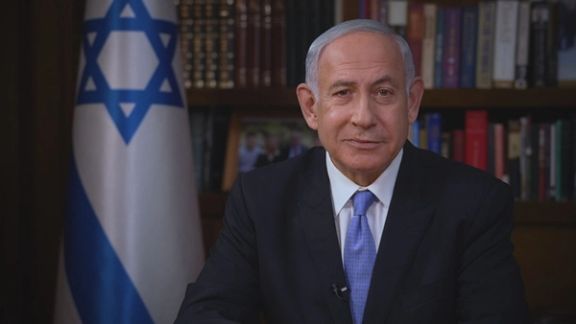
Israeli Prime Minister Benjamin Netanyahu told Iran International that Tehran is “dangerously moving forward” in its nuclear program and close to "red lines."
In an interview on Wednesday, the Israeli leader said that he returned to the government primarily to make sure that Iran cannot become a nuclear “threshold power.”
The issue of Iranian regime’s nuclear program is “the quintessential heart of my foreign policy,” he said, adding, “I came back into government precisely to prevent Iran from becoming a nuclear state,” vowing to do “everything possible to prevent it."
Netanyahu indirectly referred to recent confirmation by the International Atomic Energy Agency (IAEA) that it found uranium particles enriched to 84-percent purity, which is very close to the 90-percent enriched fissile material needed for nuclear bombs. He said that Israel will not tolerate a “nuclear threshold” Iran.
This can be seen as a threat to Tehran not to enrich uranium to 90 percent, which can put the country on the threshold of manufacturing a bomb.
He also emphasized that the Islamic Republic wants nuclear weapons “to buy immunity” both in its mischiefs against the world and also as protection from the Iranian people who reject its legitimacy.
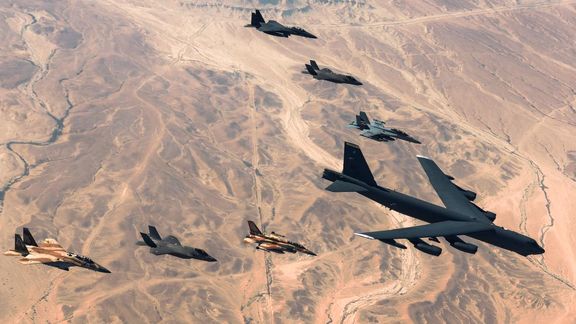
However, the Israeli premier expressed optimism that the West has become more cognizant of the dangers the Iranian regime poses to the world, not just to its own people and Israel. He attributed this “miraculous achievement” to the “courage of the Iranian people” who through their recent protests showed “the true nature” of the regime to the world.
“There is a moral imperative and a security imperative,” to stand up to the regime and take action, including “crippling” sanctions on the Revolutionary Guard (IRGC) and a “credible” military option to send a clear message to Tehran.
In recent months, the Biden administration has also warned that it will not tolerate a nuclear Iran and has boosted military coordination with Israel.
Regarding possible European sanctions on IRGC, Netanyahu said the “terrorist organization” has self-designated itself and “you don’t need special intelligence” to know that they are a terror group.
Netanyahu’s 25-minute interview was broadcast by Iran International TV into Iran Thursday evening local time with Persian dubbing. Netanyahu was asked if he has a message for Iranians and he said, “We stand with you, I stand with you, most of the world stands with you…don’t lose heart, be strong.”
He also praised Iran’s civilization and the talents and abilities of its people to achieve successes once the Islamic regime is gone. He voiced certainty that Israel and a free Iran can have solid relations.
He repeated a few times that the Islamic regime is “the common enemy” of the Iranian people, Israel and the world, arguing that the protesters “have unmasked” the regime, which is terrified.
“For such a regime to have nuclear weapons when it is committed openly to the destruction of not merely my own country but to the subjugation of the world…and chants death to Israel, death to America and everyone else in between,” is a dangerous proposition, Netanyahu said.
Addressing Western leaders he said, “History will change if Iran gets nuclear weapons.” If Iran is not stopped the world “will face a war and potentially a horrible nuclear war.”
He was asked if he could be effective in implementing his policies toward Iran’s nuclear program when he faces political challenges at home. “I never lose focus on the danger from the Islamic regime – never,” Netanyahu, whose policies and coalition government face strong popular opposition, replied.
Asked if we are close to a military conflict, the Israeli prime minister said, “It depends on Iran.” But he took issue with a recent remark by the IAEA Director General Rafael Grossi who during his recent trip to Tehran had said that any attack on any nuclear facility violates international law.
“I think he said something totally wrong and inappropriate…There is nothing more legitimate than preventing a regime that openly calls for your destruction from having the weapons to achieve that goal.”
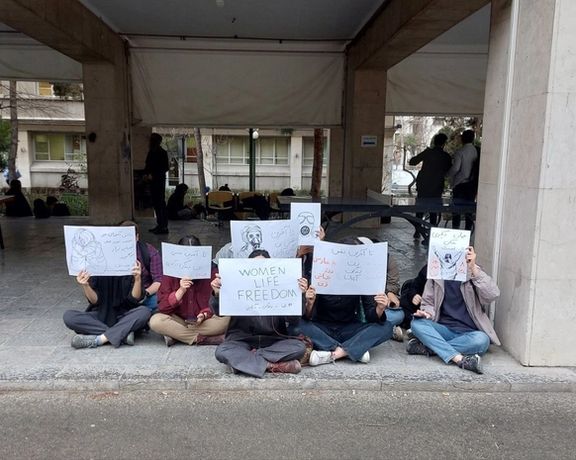
As chemical attacks continue across schools in Iran, threatening text messages from Iran's security agencies have been sent to teachers warning them from supporting protests.
Teachers and activists who organized gatherings and protests to express concern over the health of students, were also summoned by the judicial authorities.
During Tuesday's nationwide protests against the serial poisonings, the law enforcement forces violently attacked teachers and parents in different cities by firing tear gas while several were arrested.
At least 297 poisonings have been reported in girls' schools in 25 Iranian provinces since November 30when the first attack occurred in the religious city of Qom, believed to be led by regime agents in a bid to quash students' support of the 'woman, life, freedom' movement.
The chemical attacks were not limited to schools, and in the past days, female students at university dormitories have also been targeted. Nearly two thousand students have been taken to hospitals and medical centers so far.
Meanwhile, summonses and sentences for civil, political and student activists continue. In a recent case, a revolutionary court sentenced children’s rights activist Samaneh Asghari to 18 years and three months in prison, of which six years and three months can be enforced.
Samaneh Asghari, an industrial engineering student at Kharazmi University, was arrested on October 19 during a protest in Tehran.
Leila Hosseinzadeh, a political activist, and student has also tweeted that she has been summoned by the ministry of intelligence.

While the world celebrated the International Women's Day, with Iran in focus, the US bestowed the Madeleine Albright award on Iranian women.
In a ceremony hosted by First Lady Jill Biden and Secretary of State Antony Blinken at the White House on Wednesday, US Ambassador to UN Linda Thomas-Greenfield presented the inaugural Madeleine Albright Honorary Group International Women of Courage Award to the women and girls in Iran, who embarked on months of grassroots rallies following the death of Mahsa Amini, the 22-year-old Iranian woman died in ‘hijab police’ custody.
The United States also honored 11 global women leaders -- some from countries hit by crises -- to mark International Women's Day and recognize those with "exceptional courage, strength, and leadership in advocating for peace, justice, human rights, gender equity and equality, often at great personal risk and sacrifice."
Earlier in the day, US State Department Spokesperson Ned Price announced the new annual award in honor of Former Secretary of State Madeleine Albright’s legacy and her championing of women’s rights and universal rights around. “Given her longstanding support for women’s empowerment and leadership, we can’t think of someone who exemplifies the goals and values of the IWOC Award better than Former Secretary Albright,” he said, adding, “We’re proud to recognize the women and girl protestors of Iran with the inaugural Madeleine Albright Group Honorary Award this year.”
Price said that over the course of the past six months, the world has witnessed the bravery, the determination, the resilience of the protesters in Iran, so many of whom are women, noting that the leadership of this movement is in some ways dominated by women as they are at the vanguard of this movement.
“We have seen the remarkable courage of these protesters, including these women who have taken to the streets at no shortage of personal risk to themselves," he added, highlighting that “They are in prison; they’ve been harassed; they’ve been injured. In too many cases, the regime has ended their lives prematurely for doing nothing more than exercising a right that is as universal to them as it is to women and girls here in this country.”
In a statement to mark the occasion, US President Joe Biden said, “ We see it in Afghanistan, where the Taliban bars women and girls from attending school and pursuing employment. We see it in Iran, where the regime is brutally repressing the voices of women who are courageously standing up for their freedom.”
This year’s International Women's Day saw activists holding demonstrations all over the world from Jakarta and Singapore to Istanbul, Berlin, Paris, Rome, Caracas, Montevideo, and so many others with a focus on Iran, embroiled in antigovernment protests, and Afghanistan, where girls are denied the right to education.
In London, protesters marched to the Iranian embassy in costumes inspired by the novel and television series "The Handmaid's Tale", while in Valencia, Spain, women cut their hair in support of the Iranian women.
In recent days, the Islamic Republic has faced renewed global pressure amid public anger over a wave of chemical attacks on girls in dozens of schools. The regime has arrested several people it accuses of connections to the poisonings as well as to "foreign-based dissident media".
Also on Wednesday, Farhan Haq, the deputy spokesperson for the United Nations secretary-general, said the UN is following the reports about poisoning among schoolchildren and the UN Country Team has offered support to speedily and accurately ascertain the facts of this issue. "It's important for the Iranian authorities to investigate this fully and transparently, but we'll continue to monitor what's going on there,” he said.
In a tweet on Wednesday, UNESCO urged thorough investigations and immediate actions to protect schools and facilitate the return of affected students in Iran to their safe and healthy classrooms. UNESCO Director-General Audrey Azoulay expressed deep concern “about the reported poisoning of schoolgirls in Iran over the past three months,” describing the attacks as “a violation of their right to safe education.”
The UK and the US, the European Union, and Australia issued sanctions on the Islamic Republic to mark International Women's Day. The UK targeted global violators of women’s human rights, including Iran's morality enforcing outfit and its top official, while the US imposed sanctions on Iranian officials and companies over serious human rights abuses.
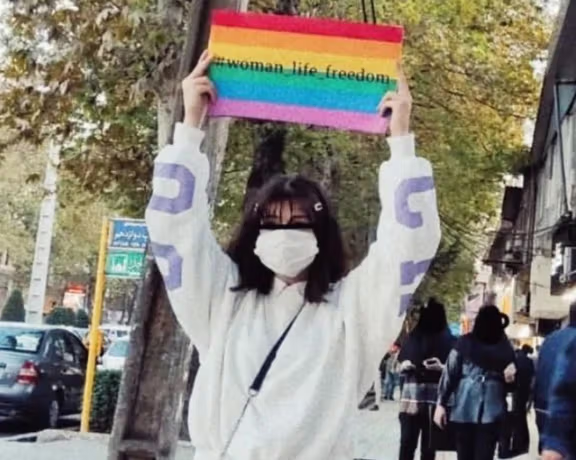
The Iranian Queer Liberation Front has vowed to continue the fight against sexual and gender apartheid in Iran.
“Feminist struggles must continue against all forms of core patriarchy upon which the regime is founded,” it announced on International Women’s Day.
The statement called the ‘Woman, Life, Freedom’ movement a turning point in the struggles of the LGBTQ community of Iran in the fight against sexual and gender apartheid and patriarchal structures.
“This year's International Women’s Day is an opportune moment to voice our common struggle louder and more expressively and renew our commitment to our joint struggle. It is a struggle that is symbolically and actually inclusive of all women,” it added.
Since the beginning of the uprising in September, Iranian LGBTQ activists have expressed their demands after the fall of the Islamic Republic by participating in popular struggles inside and outside the country.
Prominent opposition figures, including Prince Reza Pahlavi and Masih Alinejad, have repeatedly emphasized the need to support the rights and freedoms of the queer community in Iran should the Islamic Republic collapse.